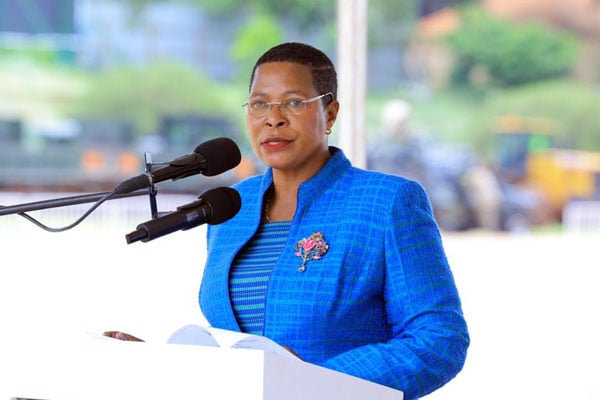Gender minister tasks men to take on unpaid care work

State minister for Gender and Culture, Ms Peace Mutuuzo. Photo | File
What you need to know:
- Unpaid care work includes household duties such as cooking, cleaning, water and fuel collection, child care, or elder care among others
Women's rights activities have called for equal distribution of unpaid care work between men and women to create ample time for the latter to engage in productive work.
Unpaid care work includes household duties such as cooking, cleaning, water and fuel collection, child care, or elder care among others.
Minister for Gender and Culture, Ms Peace Mutuuzo said cultural beliefs, norms and practices interspersed with religion have allocated a greater share of unpaid care work such as cooking to women and girls, denying them the opportunity to involve themselves in social, political and economic activities.
In a speech read by Ms Hellen Asamo, State Minister for persons with disabilities at a stakeholders dialogue on addressing the unequal allocation of unpaid care work between men and women, on Thursday, Ms Mutuzo said women and girls were over-burdened, limiting their participation in productive employment, education, political and community initiatives, and having enough sleep.
“The Uganda Time Use Survey conducted by the Uganda Bureau of Statistics (UBOS) in 2017/2018 showed that on average, women in Uganda spend more time on unpaid work (7 hours) compared to men (5 hours), while men spend more time in productive work (5 hours) compared to women(3 hours). Negative cultural and religious beliefs and norms heavily burden women and girls with unpaid care work,” she said.
Ms Mutuuzo said that deliberate interventions to harness the existing opportunities to accelerate intergenerational positive transformations towards women’s empowerment and gender equality are key.
She said Uganda’s Vision 2040 that aspires for a transformed society from a peasant to a modern cash economy and the National Development Plan 2020/21-2024/25 whose goal is to increase household incomes and improve quality of life present a great opportunity for accelerating gender equality and women empowerment.
Ms Asamo, urged women to ensure that the 30 per cent of the Parish Development Model (PDM) fund allocated to them is not misused by husbands and man friends.
While giving a Keynote speech, the Country Representative of UN Women in Uganda, Dr Pauline Chiwangu said more investments should be injected into the campaign against discriminatory social norms that continue to undermine the empowerment of women and girls.
“This should include social media campaigns led by the youth. We have a vibrant youthful population in Uganda. Formation of positive masculinity in local communities is key in addressing social norms driving gender inequality and violence against women and girls,” she said.
Ms Patricia Munabi Babiiha, the director of FOWODE said they would continue engaging religious and cultural institutions so as to build a consensus on changing negative norms and practices that undermine equal distribution of domestic work between men and women.




